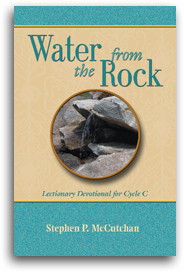SermonStudio
Proper 19 / Pentecost 17 / Ordinary Time 24
Devotional
Water From the Rock
Lectionary Devotional for Cycle C
I looked on the earth, and lo, it was waste and void; and to the heavens, and they had no light.
-- Jeremiah 4:23
The picture that Jeremiah drew of God's judgment could easily be a description of a nuclear war followed by a nuclear winter. The earth "was waste and void; and [the heavens] had no light. I looked on the mountains, and lo, they were quaking, and the all the hills moved to and fro. I looked, and lo, there was no one at all, and all the birds of the air had fled ... the fruitful land was a desert, and all its cities were laid in ruins...."
-- Jeremiah 4:23
The picture that Jeremiah drew of God's judgment could easily be a description of a nuclear war followed by a nuclear winter. The earth "was waste and void; and [the heavens] had no light. I looked on the mountains, and lo, they were quaking, and the all the hills moved to and fro. I looked, and lo, there was no one at all, and all the birds of the air had fled ... the fruitful land was a desert, and all its cities were laid in ruins...."


